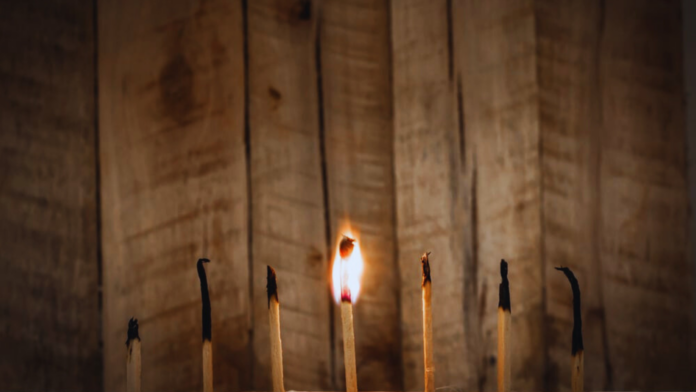Ever wonder if you’re burning out? I know a lot of leaders and people who wonder about that.
There’s a fine line between being tired and actually burning out.
The challenge is, once you cross the line, it’s so difficult to get back.
Burnout Seems To Be An Epidemic In Ministry
In fact, there are more than a few of you who know you are right on the edge of the cliff you could so easily fall off of.
Why is that?
More than most environments, ministry combines what you do (your work) with what you believe (your faith) and your community (your congregation/friends). Without skillful navigation, that can create a roller coaster of emotions that push leaders toward burnout.
I know first-hand because I’ve experienced burnout myself.
Back in 2006, I entered the darkest period of my life. People had always warned me I would burnout. I thought I could prove them wrong. And usually, I did. I would get tired – out of balance – but when I saw the edge, I could always pull myself back.
That approach worked just fine until the summer of 2006 when it didn’t.
On that fateful summer eleven years ago, I found the edge, and as I was falling, I knew this time I realized I couldn’t pull myself back.
Although I’m not a person who suffers from depression, I’m sure I would have gone to the doctor and received a diagnosis of clinical depression that summer when I fell off the edge.
Perhaps it wasn’t a stereotypical depression; I could get out of bed every day, and I did.
As a Christian, I kept praying and reading my Bible, I never lost my faith (I just couldn’t feel it), and people who weren’t that close to me didn’t realize it was happening.
But I knew something inside me had broken, and I didn’t know how to fix it. My speed decreased to a snail’s pace, my mope felt like it had died, and my motivation and passion dropped to zero. (Make that zero, Kelvin).
Like most people who experience burnout, it felt like a strange land. I had been tired before, but I had never truly been burned out. It was so disorienting I didn’t know what to do.
What terrified me was that I knew many people in ministry and that life had gone down this road before me, and some of them never made it back.
For them, ministry was done. And sometimes, tragically, they were done – hope never fully returned, and they didn’t ever become the person they were before.
That was the last thing I wanted to happen to me.
Looking back, the diagnosis is still a little elusive and mysterious. Who really knows what corrodes the soul to the point where it deflates?Burnout corrodes the soul to the point where it deflates.Share on X
But I’d say the most likely candidate for what derailed me is what I’d call emotional burnout.
In caring for others, I had not adequately cared for my heart or soul or let others who wanted to care for it do so.
I spiraled down for about 3 months before I hit bottom.
Then with the love and assistance of a great wife, board, leadership team, close friends, a counselor, and a very gracious God, I slowly began to recover.
It took, honestly, a few years to really feel full stride again, but I recovered to 80-90% of full strength in the first year. The last 10% took two or three more years.
The good news is that there is life after burnout.
Maybe you’re right on the edge of the cliff right now. Or maybe you’re in free fall. So how do you know if you’re more than just tired? How do you know if you’re burning out?
What is Burnout?
In my experience, burnout is: The point where fatigue and darkness—emotionally, physically, and mentally—move from being manageable to overwhelming.
But I also I think there’s another kind of burnout and my sense is millions are in it right now.
What is Low-Grade Burnout?
Low-grade burnout is when the functions of life continue but the joy of life is gone.
Here are 11 things I personally experienced as I burned out. I hope they can help you see the edge before you careen past it.
11 Signs You’re Burning Out
1. Your passion fades
Everybody struggles with passion from time to time, but burnout moves you into a place of sustained motivation loss.
Think about it, for those of you in leadership or ministry, you used to have a passion for what you did. Passion got you into leadership, and it’s one of the factors that makes life and leadership wonderful over a long period of time.
But when I burned out, my passion set like the sun.
I knew what I was doing was important (leading a local church), but I couldn’t feel it anymore.
I realized that a passionless leader will never lead a passionate ministry. But I just couldn’t find my passion anymore.A passionless leader will never lead a passionate ministry.Share on X
2. Your main emotion is ‘numbness’ – you no longer feel the highs or the lows
If you’re healthy, you feel things. You experience highs and lows.
When I burned out, I couldn’t feel either properly anymore.
If someone was celebrating the birth of a new child, I couldn’t feel happy. I just felt numb.
If someone was sick or fell into trouble, I couldn’t feel for them either. I just felt numb.
Burnout numbs your heart, and this was actually one of the earliest signs for me that the edge was near.
3. Little things make you disproportionately angry
It’s not that burned-out people feel zero emotion, but I know when I burned out, the emotions I felt were often just wrong.
One early sign I was heading for burnout was that little things started to set me off. Something (like a missed deadline) might be a 3 out of 10 on the problem scale, but I would react like it was an 11. That’s never good.
Treating small things like they are big things is a sign something deeper is wrong.When you regularly lose your cool over small things, it’s a sign something deeper is very wrong.Share on X
4. Everybody drains you
People are a mixed bag for sure. Some energize you. Some don’t. I get that. On this side of heaven, that’s life.
But when I burned out, I realize nobody energized me anymore. Not even my family, my friends, or my leadership team.
In my head, I knew they were good people, but my heart couldn’t feel it.
When nobody energizes you, they’re not the problem. You are.
5. You’re becoming cynical
Oh, cynicism — it grows in the hearts of far too many leaders. Not only does it impact how you lead at work or in ministry, but eventually, your growing cynicism will tear at the fabric of your marriage and even your relationship with your kids. Nobody likes a cynic.
It’s hard not to become cynical as you age (here’s why), but cynicism never finds a home in a healthy heart.
If you find your cynicism is advancing at a rapid rate, it may be a sign you’re burning out.Cynicism never finds a home in a healthy heart.Share on X
6. Nothing satisfies you
One of the hardest aspects of burnout for me was that nothing seemed to satisfy me.
Sleep didn’t. Prayer didn’t. Good people didn’t. Recreation didn’t. Vacation didn’t. Work didn’t. Food didn’t.
That’s a sign of depression, and it’s also a sign you’re burnt out.
7. You Can’t Think Straight
When you’re burning out, your heart messes with your head; you lose the ability to think straight.
I remember having read enough and listened to enough about mid-life crises and burnout to know that people make stupid decisions when they’re burnt out.
My emotions made me think I would always be this bad. That I was a failure. That there was no hope. That I should just quit.
So I had this daily conversation with myself that boiled down to five words: Just don’t do anything stupid.
For me, that meant not doing three things. I told myself, Carey, don’t:
- Quit your job
- Have an affair
- Buy a sports car
By the grace of God, I did none of the three. The first two are still part of my long-term plan, but one day I think it would be fun to have a sports car.
Some days, simply avoiding stupid is a win.
8. Your productivity is dropping
One sign I knew I was in burnout was incredibly low productivity.
I’m usually a fairly productive leader and person (some would say highly productive). But when I fell into burnout, even writing a simple email might take an hour.
I couldn’t think straight. My pace slowed right down, and I felt like there was a cloud between me and everything I was trying to do.
If you’re working long hours but producing little of value, you might be burning out.If you’re working long hours but you’re producing little of value, you might be burning out.Share on X
9. You’re self-medicating
In the early stages of burnout, many people turn to self-medicating to numb the pain.
Whether that’s overeating, overworking, sexual addictions, drinking, impulsive spending, or even drugs, you’ve chosen a path of self-medication over self-care.
I avoided drinking, drugs or sex. Ironically, my poison was more work, which just spirals things downward.
People who are burning out almost always choose self-medication over self-care.People who are burning out almost always choose self-medication over self-care.Share on X
10. You don’t laugh anymore
This is such a small thing that’s actually such a big thing.
If you’re burning out, you don’t laugh a lot. I remember in my recovery laughing out loud one day after listening to something on the radio. It was then that it hit me: it had been months since I had laughed out loud.
When you’re burning out, nothing seems fun or funny, and, at its worst, you begin to resent people who enjoy life.
11. Sleep and time off no longer refuel you
If you’re just tired, a good night’s sleep or a week or two off will help most healthy people bounce back with fresh energy.
If you’re burning out, sleep and time off no longer refuel you. You could have a month off when you’re burnt out and not feel any difference.
I took three weeks off during my summer of burnout, and I felt worse at the end than when I started. Not being refueled when you take time off is a major warning sign that you’re burning out.11 Signs You’re More Than Just Tired… You’re Burning OutShare on X
Recovering From Burnout
Nearly two decades after experiencing burnout, I have never felt better, never felt more alive, and never been more productive in my life.
And here are a few keys (of the many) from my recovery that I hope will help your journey as well.
1. Understand that limits exist for a reason
As a young leader, it’s so easy to think limits don’t apply to you. In some ways they don’t.
Until they do.
People kept telling me I would burnout. I thought I was invincible… and I was so wrong.
I have a much greater respect for God-given limits: limits for how much I can do, what I should be involved in, and even how much sleep I need.
I’ve discovered that when I respect limits, I ironically get far more accomplished. The desire to burn through all limits is, in the end, counterproductive.
2. Know that God is still present, even when he feels absent
It’s hard to feel God’s presence when you’ve hit bottom.
There were months where I simply went through the motions—praying, reading my bible and following God as best as I could, even though I felt nothing.
There were moments in which I felt there was no way God could be present because clearly I had failed him, or I wouldn’t be feeling the way I did.
But that simply isn’t true.
God was very present when I was burning out. In fact, he was doing some deep work in me: prodding, shaping and refining who I was. You could even argue he was preparing me for what was ahead.
Did it have to be as painful as it was? Of course not. Had I listened earlier and heeded the warning signs, I probably wouldn’t have burned out.
But God is sovereign, and his faithfulness doesn’t depend on me.
God is still present…even when he feels absent.
3. Managing your energy is more important than managing your time
Prior to my burnout, I worked on time management.
Since I burned out, I still work hard on optimal time management, but I’ve discovered a much better approach: energy management.
Your energy waxes and wanes throughout the day. Rather than fight that, I’ve learned to cooperate with it. I’ve discovered that there are probably 3-5 hours a day when I’m at my best (for me, that’s usually in the morning).
I’ve moved all my most important work to those hours when I’m at my best.
Doing what you’re best at when you’re at your best unlocks a world of potential many leaders miss.
I write more about how to manage your energy here.
4. Sleep is a leader’s secret weapon
Exhaustion was a major reason I burned out. Not the only reason, but a major reason.
Now, I guard my sleep zealously when I’m at home or on the road. I’ve embraced naps. And I watch my fatigue levels like a hawk.
I’ve come to realize that most of us are like our phones. You start off in the morning with 100% charge, and at various points in the day, you need to be plugged back in.
A quick nap at lunch can recharge me for a few hours. Getting 7-8 hours of sleep every night has become essential for me to perform at my best at work and at home.
Sleep is a leader’s secret weapon, so use it wisely.
So Are You More Than Just Tired?
So, how do you know if you’re burning out?
Identifying with just a few of these signs might just be a sign that you’re tired.
If you identify with half, you might be close to the edge.
If you identify with most or all, well, you might be in the same place I found myself—burnout.
And if you think you’re burning out, I would encourage you to seek immediate professional help – a medical doctor and a trained Christian counselor. I would also encourage you to talk to a close circle of friends (again, my next post will be on recovery from burnout).







